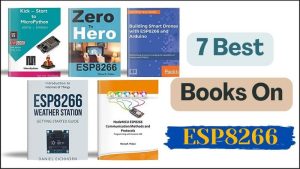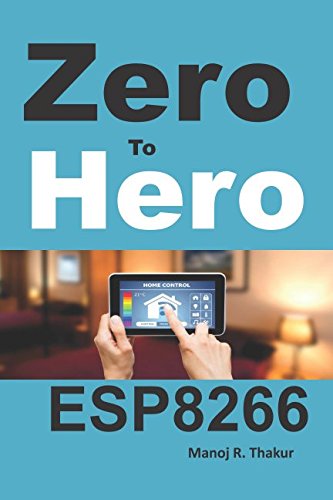Last updated on February 8th, 2025 at 12:36 pm
ESP8266 is a System on Chip (SoC) developed by Espressif Systems for Internet of Things (IoT) applications. Although an updated version of this chip, i.e., ESP32 is available in the market, you can still build several excellent-performing circuits and gadgets using ESP8266.
All you need is a little push in the right direction. We are giving you that push by providing you with our curated list of best books on ESP8266.
List of 7 Best Books on ESP8266
Which is the overall best book on ESP8266 for beginners? (Our pick)
We suggest you read Zero to Hero ESP8266 if you are a beginner. As the name suggests, this book is a great guide for those who are starting with the ESP8266. It gives an overview of the features and capabilities of the ESP8266 and guides you in setting up the development environment and write code for the chipset. The book will also help you in interfacing different sensors with ESP8266.
Best overall – Zero to Hero ESP8266 by Manoj R. Thakur
This book is ideal for people looking to learn ESP8266 programming using the Arduino IDE. The book covers major portions on drawing graphs, getting data to VB.net, hardware design aspects, using Google gadgets to show gauges, etc.
This book promises to make you an expert in the Internet of Things world. You will find that the book layout is extremely simple and easy to understand.
Pros:
- The author takes you step-by-step through the entire process of building client-server projects.
Cons:
- There are several typographical errors in the book which might be annoying for readers.
ESP8266 Weather Station by Daniel Eichhorn
If you are looking to make some practical projects using ESP8266 then this book is what you need. It covers some Internet of Things (IoT) projects that will help you understand the basics of the ESP8266 chip.
You will also learn to display weather updates or any other information on multiple side-scrolling screens. The book is divided into 7 parts. Each part is essential in understanding the architecture and workings and its application.
Pros:
- End-of-the-chapter summaries are excellent materials for understanding the knowledge accomplishments.
Cons:
- Only a Kindle version is available of this book.
- The information in the book is largely based on the product kit that the author sells.
Kick-start to MicroPython using ESP32 / ESP8266 by Harish Kondoor
Do you want to get introduced to the world of MicroPython? What’s better than using the ESP8266 board to kickstart your learning journey? In this book, you will learn all the basic aspects of MicroPython including how to install and set it up on your device.
The 6 modules will take you through each part of programming with MicroPython using the ESP8266 chip. In several instances, the author has used the ESP32 chip, but worry not all the information can be applied to the ESP8266 chip as well.
Pros:
- The ebook version of this book contains links to important reference YouTube videos and a code bundle.
Cons:
- The graphics and visuals in the paperback version are of extremely poor quality.
NodeMCU ESP8266 Communication Methods and Protocols by Manoj R. Thakur
With this book, you can explore the world of IoT with Arduino IDE. You will learn some advanced topics like MODBUS RTU, UDP, WebSocket, MODBUS TCP, etc. The author leaves no stone unturned when it comes to the basics of ESP8266. The few starting chapters are excellent for beginners to get acquainted with ESP8266.
Pros:
- You will find 30+ sample programs in the book.
Cons:
- Readers have found extreme spelling and grammatical errors in the book.
- Directly copying the code from the ebook is not possible. You will have to manually type the code to run it.
Building Smart Drones with ESP8266 and Arduino by Syed Omar Faruk Towaha
Does the idea of building drones excite you? Then why not get your hands dirty and try to leverage the capabilities of ESP8266 and Arduino to build exciting drones? With this book, you will not only learn programming but also a few electrical concepts essential to building drones.
The book teaches you to enable your devices to communicate with each other and interface with the world using digital and analog sensors.
Pros:
- You will be able to build a complete mission control drone and use it effectively at the end of this book.
Cons:
- There is not much information about filters and PDI controls in the book.
Electronics Projects with the ESP8266 and ESP32 by Neil Cameron
It is an ideal book for engineers interested in building internet-based applications with ESP8266. Through the 22 chapters of the book topics like GPS tracking with Google Maps, the combination of XML with AJAX, IFTTT for communication, app control through speech recognition, etc are covered comprehensively in an exciting manner.
You will also learn to build web pages, applications, and Wi-Fi-enabled devices. If you want to get into building electronics using ESP8266 then you should not miss out on this book.
Pros:
- The book has a dedicated section on the differences between building projects using ESP8266 and ESP32.
Cons:
- The resolution of images in the print is very book which makes the illustrations unappealing.
IoT Development for ESP32 and ESP8266 with JavaScript by Peter Hoddie and Lizzie Prader
The book is a practical guide to XS and embedded development using moddable SDK. If you are interested in building JavaScript projects using ESP8266 then this book is ideal for you. You will be able to develop IoT products using touch inputs, animated user interfaces, BLE, sensors, networking, actuators, and much more. Keep an eye out for the use of the Piu framework to build touch-responsive screen user interfaces.
Pros:
- Even if you have never used JavaScript the book has an introductory section, which will help you to get acquainted with it.
Cons:
- To undertake the projects in this book, you need to have an understanding of C/C++.
Conclusion – Best Books on ESP8266
We hope that our article has given you a clear idea of selecting the perfect book for you. But, if you are still confused about which book to purchase then let us make it easy for you. We believe “Zero to Hero ESP8266″ by Manoj R. Thakur is overall the best book on the list.
But if your focus is on JavaScript then you should go for “IoT Development for ESP32 and ESP8266 with JavaScript” by Peter Hoddie and Lizzie Prader. And for those who are also looking to learn MicroPython then “Kick-start to MicroPython using ESP32 / ESP8266″ by Harish Kondoor is best for you.














